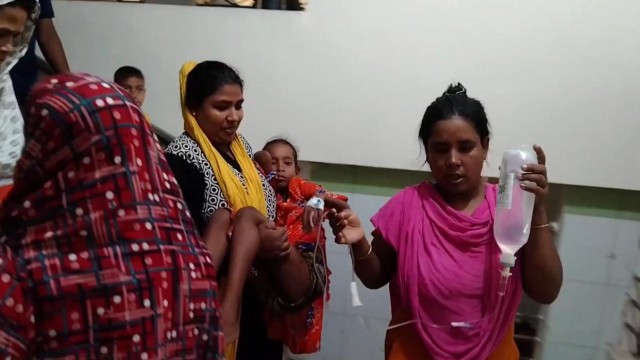
Photo: Voice7 News
A mother carries her ailing child in her arms at Mugda Medical College Hospital due to the unavailability of a stretcher, as the facility struggles to cope with the growing influx of dengue patients. (Photo: Ali Hossain Mintu/V7N)
Dhaka, July 28 (V7N) — Bangladesh is witnessing a renewed surge in dengue infections, with hospital wards overflowing and health officials urging immediate public awareness and preventive measures. According to a press release issued by the Directorate General of Health Services’ (DGHS) Health Emergency Operation Center on Sunday, the country has recorded 19,529 hospitalizations due to dengue fever so far this year, with 76 confirmed deaths as of July 27.
In a concerning development, the Mugda General Hospital in Dhaka reported overwhelming pressure from incoming dengue patients, highlighting the scale of the crisis. Hospital corridors, emergency units, and even general wards are now accommodating patients as the number of cases continues to rise rapidly, particularly during the peak monsoon months.
The same DGHS bulletin noted that in 2024 alone, from January to December, a total of 101,214 people were hospitalized due to dengue infections. Comparatively, while the current year's cumulative number is lower, the increasing rate of admissions in recent weeks has raised red flags among healthcare experts.
Of the 19,529 patients admitted this year, 18,223 have already been discharged after receiving treatment, according to the DGHS. However, the rising mortality figure — now at 76 — reflects the need for accelerated public engagement in dengue prevention and mosquito control.
Speaking to local reporters, medical staff at Mugda General Hospital described the situation as “untenable,” with resources stretched thin and staff working around the clock. "The demand for beds exceeds our current capacity. Children, the elderly, and high-risk patients are being prioritized, but the number of cases is making triage increasingly difficult," said one attending physician.
Experts point to a range of factors contributing to the surge: stagnating water in urban areas, poor waste management, uncoordinated mosquito control, and low community-level awareness. With climate conditions favoring the Aedes mosquito’s breeding, the risk of an escalation remains high.
Public health officials are calling on communities to take proactive measures by eliminating mosquito breeding grounds — such as discarded containers, clogged drains, and standing water in flowerpots or rooftops. The DGHS has urged city corporations and local governments to intensify anti-mosquito campaigns and fogging operations.
Given the seriousness of the outbreak and the strain on healthcare facilities, the DGHS emphasized the importance of early diagnosis, prompt medical attention, and avoiding self-medication.
As the country grapples with this escalating health emergency, the message from health authorities is clear: without collective public action, the toll of dengue will continue to grow.
END/AHM/SMA/

Comment: